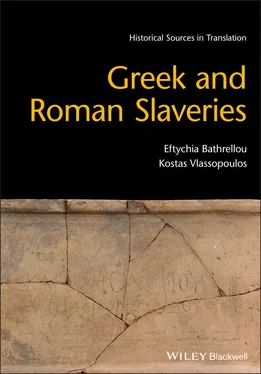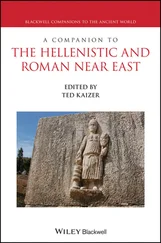2.19 Menander , Men at Arbitration , 538–49 and 557–66: 34Greek Comedy (End of Fourth/Early Third Century BCE)
The interlocutors here are two slaves: Habrotonon, a musician and hetaira working for a pimp, hired temporarily by a young Athenian man, and Onesimos, the valet of that Athenian man. The two are concocting a plan. Habrotonon, whose sexual advances have been rejected by the Athenian, will pretend to be the mother of a baby fathered by him. Then, she will look for the real mother.
Literature: Bathrellou 2012; Cox 2013; Vester 2013.
Onesimos:
But you don’t mention that you will become free. For as soon as he acknowledges you as the child’s mother, he will immediately free you, of course.
Habrotonon:I don’t know. But I’d like it to happen.
Onesimos:Don’t you know?! But what thanks will I get for this, Habrotonon?
Habrotonon:By Demeter and Persephone, I will regard you as the cause of all I might achieve.
Onesimos:But if you stop searching for her on purpose and let it drop, having thus deceived me, what will happen then?
Habrotonon:What for, dear? Do I seem to you to have set my heart upon having children? Just let me become free, gods! May this be my reward!
Onesimos:
I wish you would get it. […]
(Habrotonon exits; Onesimos remains alone on stage.)
Onesimos:The woman is full of ideas. When she saw that it’d be impossible to achieve freedom by the way of love and that she’s struggling in vain, she goes off on a new tack. I, however, will be a slave all my life – driveling me, senseless, completely incapable of planning such things! But, possibly, I will get something from her, if she succeeds. It would be right. How worthless even my calculations are, wretched me, expecting to receive thanks from a woman! Just let me avoid further trouble!
What strategies has Habrotonon used to gain her freedom?
As far as can be judged from this excerpt, is the wish of these two slaves to become free represented in a negative light or sympathetically?
What would the free audience think in hearing this slave dialogue on freedom? Would such a depiction conflict with ideas about the servile and dishonored nature of slaves?
Can we take this passage as a realistic depiction of slave mentalities?
2.20 Menander, Hero , 15–44: 35Greek Comedy (Late Fourth/Early Third Century BCE)
Daos and Getas, two male slaves, are friends.
Literature: Harris 2002.
Getas:What are you saying? Are you in love?!
Daos:I am.
Getas:Your master is giving you a double share of grain. That’s bad, Daos. You probably eat too much.
Daos:My heart aches when I see this girl who lives with us. A very good girl, of my own station, Getas.
Getas:Is she a slave?
Daos:Just so … to some extent, in a way. There was a shepherd, his name was Tibeios, and he lived here, in Ptelea. 36He had been a slave at some point when young. He had these twin children, as he himself used to say: Plangon, the girl I love –
Getas:Now I see.
Daos:And the lad, Gorgias.
Getas:He who is now looking after the sheep here, at your place?
Daos:That’s the one. Already an old man, Tibeios, their father, took one mina from my master to feed them, and then another (for there was a famine). Then he … withered away.
Getas:Possibly because your master would not give him a third mina.
Daos:Perhaps. When he died, Gorgias took a little more cash, buried him, performed the usual rites, and came here to us, bringing his sister along. He is staying on here, working off the debt.
Getas:And what of Plangon?
Daos:She works the wool together with my mistress and does some housework too. A girl so … – Getas! Are you laughing at me?!
Getas:No! By Apollo!
Daos:Getas, she is so much like a free girl; really decent.
Getas:And you? What are you doing for your case?
Daos:I’ve attempted nothing in secret, by Herakles! But I’ve spoken to my master, and he’s promised to let her l[ive with me], after he discusses it with [her brother].
What is the family history of Plangon and Gorgias? Are they slaves?
How do the children of Tibeios try to pay back their debt obligations?
How does Daos try to sort out his love life?
How credible is this fictional source for understanding the lives of slaves and their descendants?
2.21 Plautus, Persian , 251–71: 37Latin Comedy (Second Century BCE)
Toxilus, a slave, has asked his good friend Sagaristio, another slave, for a loan. With the money, he wants to buy off from her master, a pimp, the slave girl he is in love with.
Literature: Segal 1968: 102–36; Parker 1989; McCarthy 2000: 122–66; Richlin 2014.
Sagaristio: To splendid and glorious Jupiter, the son of Ops, the highest, the strong, the powerful, who bestows wealth, good hopes, abundance *** I joyously bring a thank-offering. Deservedly so, because they give this abundance of convenience to my friend in a friendly manner, so that I can bring him plenty of money on loan when he needs it. What I couldn’t even dream of or think of or believe in, namely, that I would have this opportunity, has now fallen down from heaven, as it were. For my master ( erus ) sent me off to Eretria, to buy trained oxen for him. And he gave me money because, he said, there would be a market there in a week from now. He’s stupid; he gave this money to me, whose mind he did know. I will put all this money to another use: “There were no oxen which I could buy.” Now, I will both make my friend happy and bring much good to myself. What will be of benefit for a long time, I will use up in a single day. There will be whipping on my back. I don’t care. Now I will lavish from my purse these trained oxen upon a friend. This is indeed a charming thing to do, to get a good bite out of super-stingy old men, greedy ones, tight-fisted ones, who seal up the salt-cellar with the salt, so that the slave might not get it. It is a virtue to see clearly when occasion suggests so. What will he do to me? He will order that I be beaten with whips, that I be chained in shackles. He can go hang! He shouldn’t think that I will entreat him! To hell with him! He can’t do anything new anymore to me, anything that I haven’t experienced.
How does Sagaristio treat his master’s orders?
How will Sagaristio use his master’s money? Why?
What punishment does Sagaristio expect? Does he fear it?
Can we use this comic passage to understand slave mentality?
2.22 I.P hilippi 416: Latin Funerary Inscription, Philippi, Macedonia (First–Third Century CE)
Literature: Aubert 1993; Gardner 1993: 59–60; Martin 2003: 226–7.
Here lies Vitalis, slave of Gaius Lavus Faustus, also his son, a home-born slave ( verna ), born in the household. He lived 16 years. Manager ( institor ) of the Apriana tavern, well received by the people but snatched away by the gods. “I ask you, travelers, if I ever sold somewhat less than the correct measure, in order to add to my father’s gains, forgive (me). I ask the gods above and those below that you preserve my father and mother. And farewell!”
What is the relationship between the slave and his master?
Читать дальше












